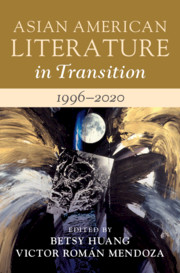Book contents
- Asian American Literature in Transition, 1996–2020
- Asian American Literature in Transition
- Asian American Literature in Transition, 1996–2020
- Copyright page
- Contents
- Illustrations
- Contributors
- Series Preface
- Acknowledgements
- Introduction
- Part I Neoimperialisms, Neoliberalisms, Necropolitics
- Part II Intersections, Intimacies
- Part III Genres, Modalities
- Chapter 9 The Asiatic Modal Imagination
- Chapter 10 Revisualizing Race
- Chapter 11 Contemporary Asian American Women’s Popular Literature and Neoliberal Form
- Chapter 12 This Is Not a Page
- Part IV Movements, Speculations
- Bibliography
- Index
Chapter 12 - This Is Not a Page
The Changing Vehicles of Asian American Literature
from Part III - Genres, Modalities
Published online by Cambridge University Press: 27 May 2021
- Asian American Literature in Transition, 1996–2020
- Asian American Literature in Transition
- Asian American Literature in Transition, 1996–2020
- Copyright page
- Contents
- Illustrations
- Contributors
- Series Preface
- Acknowledgements
- Introduction
- Part I Neoimperialisms, Neoliberalisms, Necropolitics
- Part II Intersections, Intimacies
- Part III Genres, Modalities
- Chapter 9 The Asiatic Modal Imagination
- Chapter 10 Revisualizing Race
- Chapter 11 Contemporary Asian American Women’s Popular Literature and Neoliberal Form
- Chapter 12 This Is Not a Page
- Part IV Movements, Speculations
- Bibliography
- Index
Summary
Circa 2013, finding itself without a devoted physical exhibition space, the Smithsonian Asian Pacific American Center adopted this unofficial philosophy: the soul of a twenty-first-century museum is not in the building itself but what goes inside it. With slight modification, that philosophy might apply readily to twenty-first-century Asian American literature: the soul of Asian American literature is not in the pages of a book - but neither does it reside solely in what goes on to those pages; instead, I propose, the soul is in the dynamic tension between the “content” and the means of delivery, a radically shifting set of possibilities in the twenty-first century. This chapter is a meditation on my work - as a curator with the Smithsonian Asian Pacific American Center and as the Director and co-Editor-in-Chief of the Asian American Literary Review - programming, editing, curating, publishing, projecting, and hammering and nailing Asian American literature, on the page and off, across a range of delivery vehicles. This chapter examines Asian American literature as a complex ecosystem, with writer, editor, publisher, readerships, scholars, and community organizers, among others, in dynamic interrelation. It argues for solidarity economy of the arts principles - more equitable distribution of resources; formation of cooperatives; shared commitments to intersecting forms of justice - as ways of both understanding and further growing Asian American literature.
- Type
- Chapter
- Information
- Asian American Literature in Transition, 1996–2020 , pp. 239 - 252Publisher: Cambridge University PressPrint publication year: 2021



